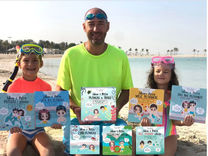Swimming: Mum, I don’t feel like going swimming anymore!
- Nov 21, 2021
- 6 min read
What should you do when a child at the age of six, eight, or ten, comes to you and says that he or she doesn’t love the sport or that he or she simply doesn't like swimming anymore, even though he or she used to play in the water, enjoy it, or get into the pool with a smile all year before that!
Parents would oftentimes stop brining their child to the trainings once the child expresses discomfort with them. To give up or to look for the cause?
If you ask me, my recommendation for parents would be to start questioning themselves, the child, but also the sport environment – swimming environment… What is it that made your child not like the sport that he or she has enjoyed quite much so far? Is it the fear that occurred suddenly? Perhaps the water was too cold so the child was freezing? Or perhaps it was a friend who started teasing the child about something? When you eliminate all these and make sure that none of the stated reasons is the cause why the child has made a barrier between himself/herself and swimming, just keep looking for it. Do not give up on sports, swimming, which your child has enjoyed so much until now, not until you find out the reason.
Below are the stories of swimmers who almost gave up swimming as they wanted more fun and play…
"Mom, I’d rather take ballet lessons than go swimming," are the words of five-year-old Maja, who has been swimming with me since she was a toddler, and she swam and enjoyed it while playing at the same time? What happened? During the summer break, she travelled to her grandmother and stayed there for three months and continued swimming there with her friends. Her mother eventually started questioning her daughter, day by day. She failed to get any concrete answer for quite some time. Regardless of her daughter's statement, she did not give up swimming and searching for the cause of "I don't like swimming".
One morning, while they were going to a ballet class, her mother asked her: Why do you like ballet? The girl’s immediate answer was: Because of everything! Mom went on with the questions: Okay, and why don't you like swimming anymore? The girl’s answer was quite specific: Because we don't play! Mom was taken aback, but kept asking questions: What do you mean by that? The five-year-old tried to explain to her mother: Well mom, it’s simple, we never play at this pool and with this coach. We never even race, we never dive, we don’t jump, we just swim and swim on and on… Mom didn't have any more questions, and the girl was right.
This is not an isolated case for children giving up on swimming because there is no play, no fun, no soul in their swimming lessons.
The goal of swimming for preschool children should be to swim and have fun, because this approach can help the child become independent and feel safe in the water. Additionally, it can make the child curious, persistent, creative, and open to hear and learn about new things. With swimming combined with playing and exploring, we "feed" our children every day with knowledge and skills that trigger not only their mind and body, but also their heart, and it also boosts their curiosity for a lifetime. Children who play in the water and enjoy swimming from an early age do not give up easily.
There’s a similar story about a boy who learnt to swim at the age of six, and then, out of the blue, gave up swimming. Swimming was a pleasure for him. In the water he was on his own. He made a quick progress and the coaches transferred him from one group to another, to swim with older swimmers. The years went by and the parents were so proud of their swimmer. However, after a summer break, eight-year-old Marko, who spent the summer break in a swimming camp at "my pool", and who loved swimming, said: "Dad, I don't like swimming anymore"!
Why, was quite a logical question the parent made? The boy was clear: Dad, we swam in the camp for three weeks, but we also played while we swam. Every day we had various tasks to solve while we were swimming and exercising in the water. It was interesting for me to swim there every day, and here in my club I never had that. Somehow, here in the training, we would always quickly jump into the pool, swim and jump out of it, take a shower and go home.
The truth is that, unlike other sports in which there may be more fun, swimming can get monotonous and boring sometimes – children hardly have time to take a breath between strokes and breathe properly. When I was a young coach, they convinced me that if we really wanted to achieve something in swimming and make a result with children from the earliest age, and even later, there is no room for fun and play. Today, I can say with certainty, and also from my experience, that this is NOT TRUE. There is room and time for results that will come later, when the child plays, when the child stops being a child and becomes ready for serious work in the pool, when the child becomes mature, both with swimming and age, and when we manage to keep a smile on the child’s face in the pool even when the child is 14 or 15 years old.
Swimming itself and the way in which you will present it to children from the youngest age depends exclusively on the coach. Here I’m not talking about the coach who just walks by the edge of the pool, but the one who enters the water and shows the children how and what they need to do in order to swim today and tomorrow and enjoy the water. Then, your child definitely won’t come to you saying: mom, dad, I don't like to go swimming anymore. I remember I was happiest when my coach jumped into the water, swam and played with us. Yes, that rarely happend, but I still remember those trainings, they are my favourite!
If you bring fun to every lesson in the pool, the children will have a reason to come back tomorrow and continue swimming and playing in the water and enjoy it. It makes sense, doesn't it?
By using games, songs, an interesting story in the water, and presenting the pool as a playground, I motivate children to learn to swim every day. That is how I motivated my children Little Shark and Little Fish from very early age to love water, swim and enjoy. That is why Little Shark, when he was less than two years old, once he felt safe in the water, swam 10m in a pool after overcoming floating positions, the so-called floating star on his stomach and back. Unlike him, Little Fish was much more careful in the game itself both in and around the water. I respected that.
The child's environment, either in the classroom or ar the pool, in and around the water, changes every day. This means that our way of transferring knowledge and skills in swimming should be adapted to children on a daily basis. On the other hand, each child is an individual for himself/herself, so the challenge of playing and mastering the skill for a lifetime is even greater.
Because of their dad's job two of my swimmers moved to another city four years ago. Of course, they continued to swim and enjoy the new environment with their new friends. They often come with their family on weekends visiting their old friends and always come to say hi to me. That's how it was last winter… Their dad called me to ask me a favour: "Can Miška and Janika come tomorrow and swim with the other children in the group, at your pool?" I was happy to hear that. The next day, they came to the training and entered the pool with a smile. By the way, they normally swim twice a week for their school team, and they also have trainings six times a week in the new club. It’s obvious that swimming is still a game for them, not an obligation! At the end of the training, their dad came to me and said: “This was their only birthday wish - to swim with you again! Thank you. Now they can easily blow out birthday candles and make a new wish.”
Dear parents, swimming is the best partner in raising and shaping your children into healthy, good and hard-working people. You will never make a mistake with swimming, regardless of the age and physical readiness of the child.
Children are ready to learn anything if combined with playing.
This is why it is important for us to give it to them.





































































Comments